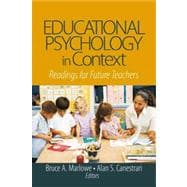
Note: Supplemental materials are not guaranteed with Rental or Used book purchases.
Purchase Benefits
What is included with this book?
| Acknowledgments | xi | ||||
| Introduction: Theory Into Practice | xvii | ||||
| Part I: Real Classrooms | 1 | (42) | |||
|
|||||
|
3 | (1) | |||
|
3 | (1) | |||
|
4 | (9) | |||
|
|||||
|
13 | (1) | |||
|
13 | (1) | |||
|
14 | (9) | |||
|
|||||
|
23 | (1) | |||
|
24 | (1) | |||
|
24 | (12) | |||
|
|||||
|
36 | (1) | |||
|
37 | (1) | |||
|
37 | (2) | |||
|
39 | (2) | |||
|
41 | (2) | |||
| Part II: How Does Learning Occur? | 43 | (52) | |||
|
|||||
|
45 | (1) | |||
|
46 | (1) | |||
|
46 | (10) | |||
|
|||||
|
56 | (1) | |||
|
56 | (1) | |||
|
57 | (10) | |||
|
|||||
|
67 | (1) | |||
|
68 | (1) | |||
|
68 | (11) | |||
|
|||||
|
79 | (1) | |||
|
79 | (1) | |||
|
80 | (11) | |||
|
91 | (2) | |||
|
93 | (2) | |||
| Part III: What Role Does Maturation Play in Learning? | 95 | (50) | |||
|
|||||
|
97 | (1) | |||
|
98 | (1) | |||
|
98 | (9) | |||
|
|||||
|
107 | (1) | |||
|
108 | (1) | |||
|
108 | (9) | |||
|
|||||
|
117 | (1) | |||
|
117 | (1) | |||
|
118 | (9) | |||
|
|||||
|
127 | (1) | |||
|
127 | (1) | |||
|
128 | (13) | |||
|
141 | (2) | |||
|
143 | (2) | |||
| Part IV: How Should Student Diversity Affect Teaching Practice? | 145 | (52) | |||
|
|||||
|
147 | (1) | |||
|
147 | (1) | |||
|
148 | (12) | |||
|
|||||
|
160 | (1) | |||
|
161 | (1) | |||
|
161 | (9) | |||
|
|||||
|
170 | (1) | |||
|
171 | (1) | |||
|
171 | (10) | |||
|
|||||
|
181 | (1) | |||
|
182 | (1) | |||
|
182 | (11) | |||
|
193 | (2) | |||
|
195 | (2) | |||
| Part V: What Factors Influence Student Motivation? | 197 | (44) | |||
|
|||||
|
199 | (1) | |||
|
200 | (1) | |||
|
200 | (6) | |||
|
|||||
|
206 | (1) | |||
|
207 | (1) | |||
|
207 | (11) | |||
|
|||||
|
218 | (1) | |||
|
219 | (1) | |||
|
219 | (9) | |||
|
|||||
|
228 | (1) | |||
|
229 | (1) | |||
|
229 | (8) | |||
|
237 | (2) | |||
|
239 | (2) | |||
| Part VI: What Do Good Assessments Look Like? | 241 | (40) | |||
|
|||||
|
243 | (1) | |||
|
244 | (1) | |||
|
244 | (7) | |||
|
|||||
|
251 | (1) | |||
|
252 | (1) | |||
|
252 | (12) | |||
|
|||||
|
264 | (1) | |||
|
265 | (1) | |||
|
265 | (6) | |||
|
|||||
|
271 | (1) | |||
|
272 | (1) | |||
|
272 | (5) | |||
|
277 | (2) | |||
|
279 | (2) | |||
| Index | 281 | (18) | |||
| About the Editors | 299 |
The New copy of this book will include any supplemental materials advertised. Please check the title of the book to determine if it should include any access cards, study guides, lab manuals, CDs, etc.
The Used, Rental and eBook copies of this book are not guaranteed to include any supplemental materials. Typically, only the book itself is included. This is true even if the title states it includes any access cards, study guides, lab manuals, CDs, etc.